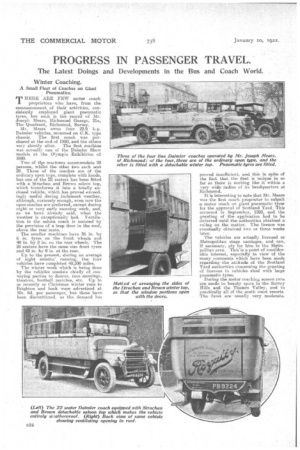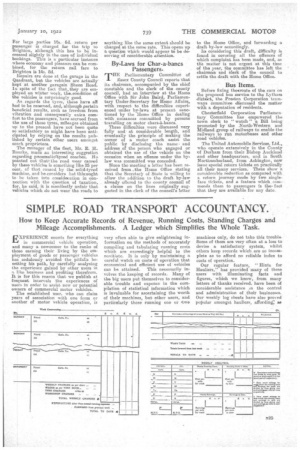PROGRESS IN PASSENGER TRAVEL.
Page 22

Page 23

If you've noticed an error in this article please click here to report it so we can fix it.
The Latest Doings and Developments in the Bus and Coach World.
Winter Coaching.
A Small Fleet of Coaches on Giant Pneumatics.
THERE ARE FEW motirir coach proprietors who have, from the commencement of their activities, consistently -employed giant pneumatic tyres, but such is the record of Mr. Joseph Mears, Richmond Garage, 21a, The Quadrant, Richmond, Surrey.
Mr. Mears owns four 22.9 hp. Daimler vehicles, mounted on .C.K. type chassis. The first coach was parchased at the end of 1920, and the others very shortly after. The first machine was actually one of the Daimler Show models at. the Olympia Eihibition of 1920.
Two of the machines accommodate 22 persons, whilst the other two each seat 28. Three of the coaches are of the ordinary open type, complete with hoods, but one of the 22 seaters has been fitted with a Strachati and Brown saloon top, which transforms it into a totally enclosed vehicle, which haz proved exceedingly useful during inclement weather, although, curiously enough, even now the open coaches are preferred, except during night or very early morning work, and, as we havealreac, k said, when the weather is exception'ally bad. Ventilation in the saloon coach is assisted by the provision of a trap door in the roof, above the rear seats.
The smaller machines have 36 in. by 6 in. tyres on the front wheels and 10 in. by 8 in. on the rear wheels. The 28 seaters have the same size front tyres and 42 in. bv 9 in. at the rear.
Up to the present, during an average of eight months' ronning, the four vehicles have completed 40,600 miles.
The winter work which is being done by the vehicles consists chiefly of conveying parties to dances, race meetings, theatres, football matches, etc. Up to as recently as Christmas winter runs to Brighton and back were -advertised at 10s. 6d per passenger, but these have been discontinued, as the demand has proved insufficient, and this in spite of the feet that the fleet is 'unique in so far as there is nothing like it within a very wide radius of its headquarters at Richmond.
it is interesting to note that Mr. Mears was the first coach proprietor to suit a motor coach on giant pneumatic tjuse for the approval of Scotland Yard. This occurred in September, 1920, and the granting of the application had to be deferred until the authorities obtained a ruling on the matter. The licence was eventually obtained two or three weeks ater.
The vehicles are actually licensed as Metropolitan stage carriages, and can, if necessary, ply for 'hire in the Metre• politan area. This'is a point ,of considerable interest, especially in view of the many comments which have been made regarding • the attitude of the Scotland Yard authorities concerning the granting of licences to vehicles shod with large pneumatic tyres.
During the motor coaching season runs are made to beauty spots in the Snrrey. Hills and the Thames Valley, 'and to practically all of the south coast resorts. The fares are usually very moderate. For large parties 10s. 6d, return per pasaenger is charged for the trip to Brighton, although this has to be increased slightly in the case of indiViduaI bookings. This is a particular instance where economy and pleasure can be combined, for the return rail fare to Brighton is 14s. 8d. Repairs are done at the garage in the Quadrant, but the vehicles are actually kept at another garagein Sheen Road. In spite of the fact that they are employed. on winter work, ti;e...contlition of the vehicles is surprisingly good As regards the tyres, these have all had to be renewed, and, although pertain beneficial results, such as freedom from vibration and consequently extra comfort to the passengers,'have accrued from the use of these tyres, mileages obtained up to the present have not been quite so satisfactory as might have been anticipated by relying on the results published by certain other users amongst coach proprietors. The manager of the fleet, Mr. E. H. Rourke, made an interesting suggestion, regarding peenniatie:tyred coeehee. lie pointed out thatrthe road, wear caused by these vehicles is something like 25 per cent. of that caused by the solid-tyred machine, and he-considers hat thisanight to be taken into consideration in connection with the question of taxation, for, he said, it is manifestly unfair that vehicles which do not wear the roads to anything like the same extent should be charged at the same rate. This opens up a question which would appear to be deserving of considerable attention.
By-Laws for Char-a-bancs Passengers MITE Parliamentary Committee of 1 Essex County Council reports that its chairman, accompanied by the chief constable and the clerk of the county council, had an interview at the Homo Office witb Sir John Baird, Parliamentary Under-Secretary for Home Affairs, with .respect to the difficulties experienced under by-laws at present sanctioned by the Home Office in dealing with nuisances committed by persons travelling, on motor chars-A-banes. These difficulties were discussed very fully and at considerable length, and eventually the principle of making the owner of a motor coach assist the public by disclosing the name, and address of the person who engaged or obtained the use of the vehicle on the occasion when an offence under the by. law was committed was conceded. Since the meeting a letter has been received from :the Home Office stating that the Secretary of State is willing to allow the addition to the draft by-law already offered to the county council of a clause on the lines originally suggested in the clerk of the council's letter to the Home Office, and forwarding a draft by-law accordingly. considering this draft, difficulty is found in coveting all the offences of which complaint has been made, and, as the matter is not urgent at this time of the year, the committee has left the chairman and Clerk of the council to settle the draft with the Home Office.
Bus Items.
Before fixing thesroute of the cars on the proposed bus service to tbo Lytham dieteict, the Preston Corporation tramways committee discussed the matter with a deputation of residents. Chesterfield Corporation Parliamentary Committee has empowered the town clerk to " watch " 'a Bill being promoted by the North-Western and Midland group of railways to enable the railways to run rnotorbusea and ether road vehicles.
The United Automobile Services, Ltd., who operate extensively in the County of Durham from their Bishop Auckland and other headquarters, and. in South Northumberland, from Ashingtori, now issue special return tickets on practically all their many services. These show a considerable reduction as compared with a return journey made by two singlefare tickets, and a feature which cornmends them to passengers is thefact that they are available for any date.


































